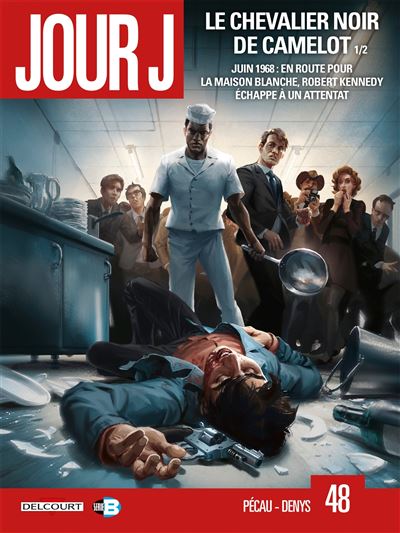Looking for a different superhero story? Follow the Stealth in the dangerous African-American suburbs of Detroit. However, the biggest threat in this comprehensive Delcourt narrative is not gang violence but disease…
Moving forward
Stealth is a crime-fighting superhero for decades in Detroit. It initially appears as a banal cocktail of superheroes: Falcon because this African-American hero has wings, Iron Man or X-O Manowar by the futuristic armor and Batman by his action of urban vigilante. Nate Bellegarde's classic drawing reinforces this sense of déjà vu as do the covers of all episodes by Jason Howard of Big Girls. Stealth is fighting a supervillain who wants to rule Detroit's underworld. We quickly understand it, but these first pages deliberately lose the reader by juxtaposing the violent interventions of Stealth in the streets and the difficulties of the African-American journalist Tony with his aging father. The reader feels that there is a connection and thinks that Tony is Stealth. At the end of the first chapter, a fearsome cliffhanger reveals that Stealth is not Tony but his father. This is only the first surprise of a very clever tale. Mike Costa builds the façade of a classic superhero story between action and thriller and we have fun following a chase and a gang war but the story goes further. 
A family story
Stealth's superhero career is very much tied to his family. The desire to change the city runs through generations in this story of filiation between a father and his son. Stealth has become a superhero for bringing justice to the streets of poor neighborhoods and does not hesitate to resort to violence while his son Tony Barber is a committed journalist at the Detroit Herald who rages at social injustice. It is therefore no coincidence that Robert Kirkman, the father of Walking Dead, participates in the creation of this character because the theme of family runs through his work. However, the Barbers no longer understand each other.
Stealth, a sick person's story
Tony's father is affected by Alzheimer's disease. Seriously ill, he confuses his son Tony and his brother Eric. Despite everything, he refuses to hang up the gloves not realizing his weakness. In a beautiful inner dialogue, Mike Costa shows the confusion of the father who no longer recognizes himself in the mirror, mixes dream and reality. He keeps repeating the same phrases because he loses his train of thought. This dementia creates suspense as the son goes in search of his father overpowered by his armor. His status as a superhero makes the situation much more dangerous for his family but also for the city: Stealth confuses child kidnappers with plainclothes policemen. 
A variation in the ghetto
This degeneration of the hero is the symbol of that of the city and the end of the American dream. The two Barbers sacrifice themselves for the community. The book begins on the one hand with excerpts from a press article by Tony describing the Detroit drift. The population has fled the economic crisis since the 70s with the closure of car factories. Those who remain are mostly poor African-Americans. Stealth is immersed in an urban war more violent and ruthless than in the Middle East. However, there are signs of renewal as neighborhoods are revived and the metropolis is experimenting but this growth benefits the rich and whites. We feel that the screenwriter knows Detroit and its history. Behind a classic superhero tale, Stealth hides a moving father-son relationship and a deep reflection on the illness not only of one man but of an entire city. This complete narrative pushes the reader out of his habits and the ending turns the whole narrative around, leaving him lost in his thoughts about heroism and utopia. If you liked this column on a committed story, you can find another text on Excellence, but on the other hand, if you prefer to learn more about Robert Kirkman's new series , you have to follow Fire Power.






































